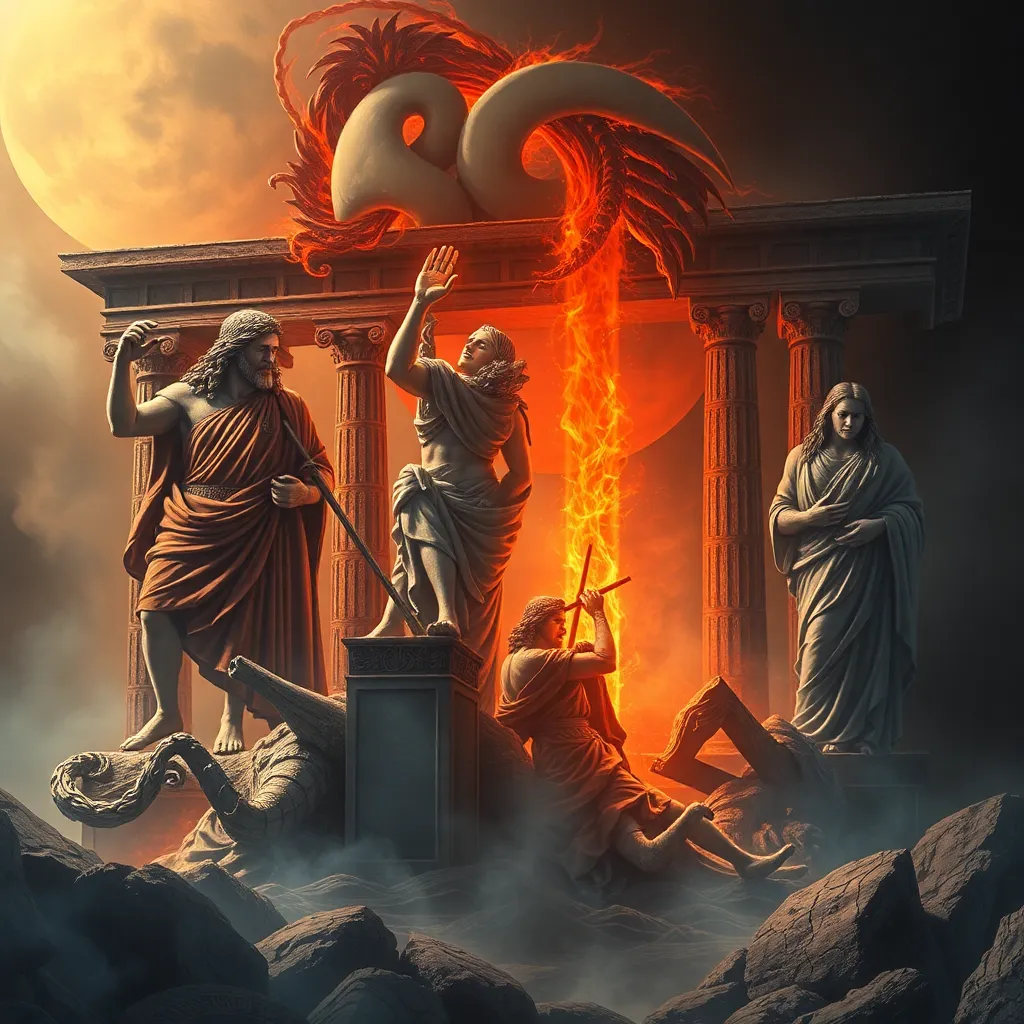The Olympians and Their Connection to the Underworld: Myths of Death
I. Introduction
Greek mythology is a rich tapestry of stories that explore the divine and the mortal, intertwining the lives of gods, heroes, and the human experience. Central to these myths is the pantheon of Olympian gods, each representing various aspects of life and nature. Among these, the Underworld plays a crucial role, serving as the realm of the dead and a significant counterpart to the vibrant world of the living.
The Underworld, ruled by Hades, is not merely a place of darkness and despair; it embodies the complex views of death, the afterlife, and the transition between life and death. This article aims to delve into the intricate connections between the Olympians and the myths of death, exploring how these narratives reflect ancient beliefs and cultural values.
II. The Role of Hades: God of the Underworld
Hades, the brother of Zeus and Poseidon, holds a unique position among the Olympians. Unlike his siblings who govern the sky and the sea, Hades presides over the Underworld, a domain often misunderstood and feared.
Characteristics of Hades include:
- Stoic and Unyielding: Hades is often depicted as a stern figure, embodying the inevitability of death.
- Wealth of the Earth: Known as “Plouton,” he also represents the riches found underground, including minerals and fertile soil.
- Keeper of Souls: His primary duty is to oversee the souls of the deceased, ensuring order in his realm.
Myths surrounding Hades often involve his interactions with other gods and mortals. A notable example is his role in the abduction of Persephone, which illustrates both his authority and the gravity of death in the Greek worldview.
III. Persephone: The Queen of the Underworld
Persephone, the daughter of Demeter, is a pivotal figure in Greek mythology, representing the duality of life and death. Her story begins with a tragic abduction by Hades, who takes her to the Underworld, leading to her becoming the Queen of the dead.
The myth of Persephone’s abduction is not just a tale of loss; it signifies the seasonal cycle. When Persephone descends to the Underworld, Demeter mourns, causing winter to blanket the earth. When she returns, spring emerges, symbolizing rebirth and renewal. This cyclical nature reflects the interconnectedness of life and death:
- Winter: Represents death and dormancy.
- Spring: Symbolizes rebirth and life.
Persephone’s dual role as both a goddess of spring and the dead emphasizes the Greeks’ understanding of death as a part of life, bridging the gap between these two realms.
IV. The Chthonic Deities: Guardians of the Underworld
Beyond Hades and Persephone, Greek mythology includes several chthonic deities, lesser-known figures who govern various aspects of the Underworld. Two notable deities are:
- Thanatos: The personification of death, often depicted as a winged spirit. He represents the peaceful aspect of death, guiding souls to the Underworld.
- Hypnos: The god of sleep, who is frequently associated with death as a form of eternal rest.
These chthonic deities play vital roles in the myths, interacting with the Olympians and influencing mortal fates. Their presence reinforces the notion that death is a natural part of existence, rather than something to be feared.
V. The Concept of Death in Olympian Myths
Death in Greek mythology is portrayed in various ways, illustrating the complexity of this universal experience. Key representations include:
- Death as a Transition: Many myths depict death not as an end but as a passage to another state of being, highlighting the potential for rebirth and transformation.
- Death as an End: Conversely, certain tales emphasize the finality of death, particularly in the context of punishment or loss.
The Olympians significantly influence mortal fates, often deciding who lives and who dies. Their interventions in human affairs reflect the belief that the gods have control over the destinies of mortals, reinforcing the connection between divine will and human existence.
VI. Heroic Journeys to the Underworld
Many heroes in Greek mythology undertake journeys to the Underworld, facing trials and tribulations that challenge their character and resolve. Notable examples include:
- Orpheus: His quest to retrieve his wife Eurydice from the Underworld highlights themes of love, loss, and the power of music.
- Heracles: As part of his twelve labors, he descends into the Underworld to capture Cerberus, showcasing bravery and the hero’s struggle against death.
These journeys serve as narrative devices for character development, emphasizing redemption, sacrifice, and the profound impact of death on the living.
VII. The Afterlife: Beliefs and Rituals
Ancient Greeks held diverse beliefs about the afterlife, significantly shaped by their myths. Key aspects include:
- The Role of the Olympians: The gods, particularly Hades and Persephone, were believed to guide souls to their final resting places, emphasizing the interconnectedness of life and death.
- Mythological Rituals: Rituals such as funerals and offerings were vital for appeasing the gods and ensuring safe passage for the deceased, reflecting society’s respect for the dead.
These beliefs and practices underscored the importance of honoring the dead and recognizing the ever-present nature of death in human life.
VIII. Conclusion
The connection between the Olympians and the Underworld reveals a profound understanding of death in Greek mythology. Through the stories of Hades, Persephone, and various chthonic deities, we see that death is not merely an end but a crucial aspect of existence that intertwines with life.
The lasting impact of these myths continues to resonate in culture and literature, reflecting our ongoing fascination with the mysteries of death and the afterlife. As we explore these narratives, we gain insight into the ancient Greeks’ views on mortality, reminding us of the universal human experience of loss and remembrance.




